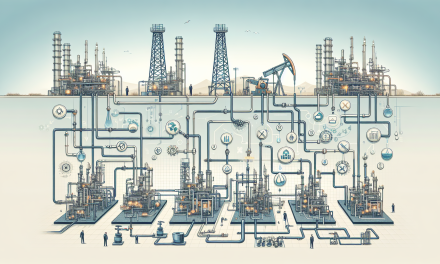Table of Contents
- Understanding Refinery Yield Optimization
- The Importance of Yield Optimization
- Key Techniques and Strategies for Yield Improvement
- Advanced Training and Resources
- FAQs
- Conclusion
Understanding Refinery Yield Optimization
In today’s ever-evolving energy landscape, optimizing refinery processes is more critical than ever. Refinery yield optimization involves enhancing the efficiency of various refining processes to maximize the output quality and quantity of petroleum products while minimizing waste. By leveraging advanced technologies and methodologies, refineries can achieve significant improvements in their yield metrics.
The Basics of Refinery Yields
At its core, yield in a refinery context refers to the amount of a desired product produced from a given amount of crude oil. This concept highlights the importance of effective process management, as inefficient operations can lead to significant losses of valuable products. Furthermore, achieving optimal yield not only benefits profitability but also aligns with sustainable practices by reducing environmental impact through waste minimization.
The Importance of Yield Optimization
Yield optimization holds a crucial place in the petroleum refining industry because it directly impacts the financial success of operations. In a market characterized by fluctuating oil prices and increasing competition, refining companies must maximize their yields to stay ahead. Here are several key reasons why yield optimization is indispensable:
1. Financial Performance
Higher yields lead to greater amounts of refined products, which translates into increased revenue. Conversely, low yields can decimate profit margins. Therefore, refineries that focus on refining their processes will see significant advantages in financial performance.
2. Asset Utilization
Optimizing refinery yields ensures better utilization of assets. When a refinery operates at its best, it not only enhances production levels but also extends the life of processing equipment. This results in reduced maintenance costs and downtime, thereby improving overall operational efficiency.
3. Environmental Responsibility
Minimizing waste through optimal refining practices translates into a smaller environmental footprint. By increasing yield and reducing emissions and other waste materials, refineries contribute positively to environmental sustainability. Thus, yield optimization is not merely an operational goal; it is also an ethical responsibility.
Key Techniques and Strategies for Yield Improvement
Enhancing refinery yields involves a combination of innovative strategies and cutting-edge technologies. Below are some effective techniques that refineries can adopt:
1. Advanced Process Control (APC)
Implementing APC allows refineries to maintain optimal operating conditions consistently. By utilizing real-time data and predictive analytics, refiners can adapt to changing conditions and ensure that processes operate within the most efficient parameters. This not only improves yield but also enhances product quality.
2. Process Simulation and Optimization
Utilizing process simulation tools can provide valuable insights into potential yield improvements. These tools can model different scenarios, enabling operators to understand how changes in variables impact yield outcomes. By analyzing various operating conditions, refineries can identify the most effective strategies for optimization.
3. Training and Upskilling Workforce
Continuously educating and training staff on the latest technologies and methodologies is vital. Investing in workforce education fosters a culture of innovation and efficiency. For example, workshops like the Refinery Yield Optimization & Process Improvement Course offer invaluable insights into maximizing refinery effectiveness. With well-trained employees, refineries are better positioned to implement yield optimization strategies successfully.
4. Collaboration and Best Practices
Networking within the industry to share best practices can lead to significant yield improvements. By collaborating with other professionals and organizations, refineries can learn from each other’s experiences and apply successful strategies to their operations. This knowledge-sharing approach encourages the adoption of innovative techniques that can lead to higher yields.
5. Regular Equipment Maintenance
Maintaining equipment regularly is crucial for optimum yield. Over time, equipment may experience wear and tear, which can hinder performance. Regular maintenance checks and timely repairs help ensure that machines operate at peak efficiency, subsequently contributing to better yields.
Advanced Training and Resources
In the quest for yield optimization, various resources and training options are available:
Mastering Petroleum Refining Strategies
Refining professionals can benefit from studying comprehensive resources, such as the article on Mastering Petroleum Refining Strategies for Production Planning, Scheduling and Yield Optimization. This valuable guide provides insights into effective scheduling and planning techniques that can boost yields significantly.
Deep Dive into Industry Training
Further expertise can be developed through in-depth programs, like the Mini-Master in the Petroleum Industry Training. Such programs delve into various aspects of the petroleum industry, enhancing participants’ knowledge and capabilities.
A Comprehensive Guide to Mastering the Petroleum Industry
Another excellent resource is the Ultimate A-Z Guide to Mastering the Petroleum Industry. This guide covers a wide breadth of topics, from refinery operations to market analysis, which is essential for anyone aiming to excel in this field.
Process Plant Equipment Integrity
Understanding equipment integrity is key to any successful refining operation. The Comprehensive Guide to Process Plant Equipment Integrity offers advanced techniques for inspection and evaluation. Mastery of these techniques empowers refineries to ensure their equipment works efficiently, thus optimizing yields.
Fundamentals of Process Technology
Lastly, understanding the fundamental principles of process technology is vital. The resource on Unlocking the Fundamentals of Process Technology provides an in-depth exploration of key concepts, making it an essential read for anyone in the petroleum refining sector.
FAQs
Q1: What is refinery yield optimization?
A: Refinery yield optimization refers to the practices and processes employed to maximize the output quality and quantity of petroleum products while minimizing waste. It involves using various techniques and strategies to improve the efficiency of refining operations.
Q2: Why is yield optimization important in refining?
A: Yield optimization is important because it directly impacts the financial performance of a refinery. Higher yields result in greater revenues and improved asset utilization, while also supporting environmental sustainability through waste minimization.
Q3: What techniques can be used for optimizing refinery yields?
A: Techniques for optimizing refinery yields include advanced process control, process simulation, workforce training, collaboration, and regular equipment maintenance. Each of these methods contributes to enhancing operational efficiency and maximizing output.
Q4: Where can I learn more about yield optimization?
A: Numerous resources are available for learning about yield optimization, including specialized readings and workshops. For instance, the Refinery Yield Optimization & Process Improvement Course offers practical knowledge for practitioners in the field.
Conclusion
Optimizing refinery processes for maximum yield is a multifaceted endeavor that merges technology, human expertise, and sustainable practices. As the industry continues to evolve, the importance of refining operations cannot be overstated. By embracing advanced techniques and investing in workforce training, refineries can significantly improve their yields. Embracing these strategies not only leads to higher revenue but also promotes environmental responsibility—a win-win situation for all stakeholders involved in the petroleum refining process.





